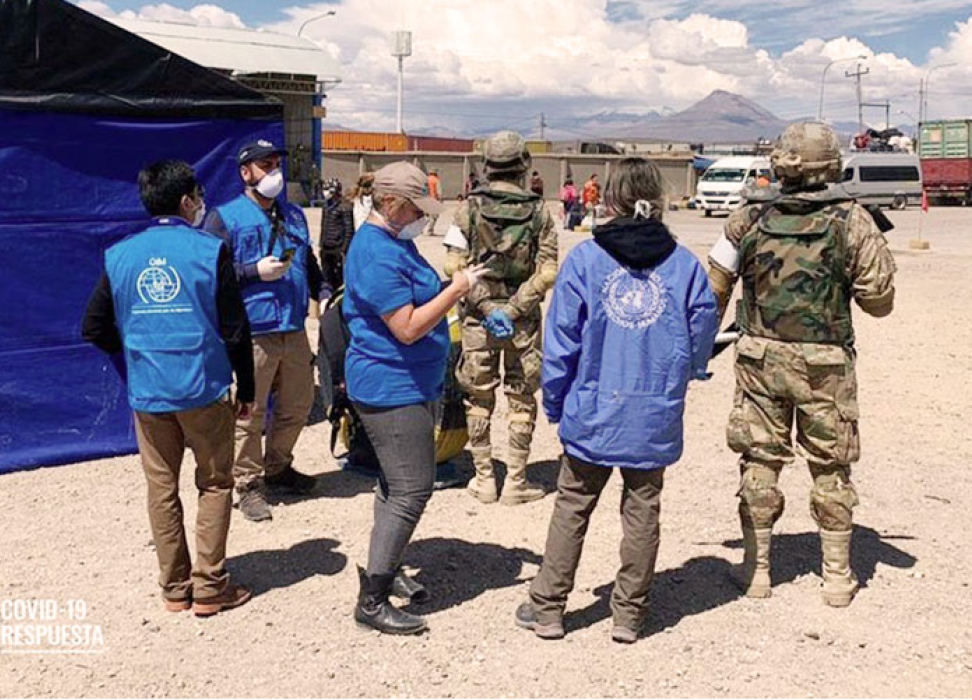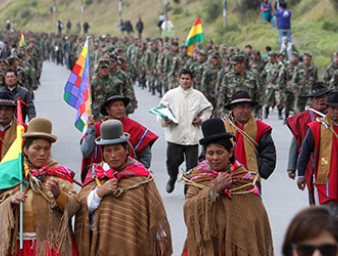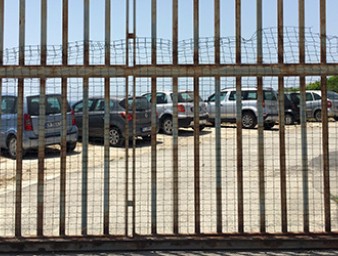Supporting the human rights of migrants in quarantine camps
10 July 2020

One of the effects of emergency measures to contain the spread of COVID-19, was enforced lockdown coupled with border closings, which left many migrants scrambling to find ways to return home without being trapped.
Such was the case in Bolivia. On 25 March, the Government enacted a total quarantine without prior notice, leaving thousands of Bolivians working in bordering countries like Chile caught in the rush to get home. Many of those migrants, who had lost jobs in border countries because of lockdown measures, found themselves stuck, waiting days at a time at the border or in makeshift quarantine camps.
"Migrants during this pandemic not only face the risks and threats that they historically and commonly suffer, but they are further exposed to the risk of contracting the virus, discrimination, stigmatization, exclusion and forced evictions," said Alán García, head of UN Human Rights in Bolivia. "Many Bolivians who had migrated to neighbouring countries now seek to return to their country, because they have lost their jobs and want to be with their families."
Jacier, a 19-year-old migrant was one of those migrants.
"I went to Chile to seek opportunities to work and support my family. Now that I have lost my job, I am looking forward to seeing my mother and helping her," Jacier said.
Camps of uncertainty
The Bolivian government built quarantine camps along the borders with several countries including Chile, Argentina and Brazil. The first of these was called Camp Tata Santiago, located in the district of Pisiga (Oruro-Bolivia) on the border with Chile.
Camp Tata Santiago is located some 3,695 meters above sea level, surrounded by the Andes and nestled in a desert. Nearly 500 people, including children, indigenous people, and persons with disabilities, were housed in 66 tents there.
"At the beginning, there was a challenge due the lack of adequate food, water and sanitation, overcrowded conditions and little ability to practice physical distancing measures necessary during the quarantine", said, Jackeline Ruiz, human rights officer from the UN Human Rights technical mission to Bolivia. "Many were unsure when they were going to be able to leave the camps; some had underlying health conditions and situations that increased their risk of infection; many were not able to communicate with their families".
In response, UN Human Rights and the UN system coordinated with national and local authorities, as well as NGOs, to improve the conditions in the camp and protect migrants' human rights.
"From the first moment of camp installation, the UN Human Rights technical mission to Bolivia was present for the opening of the camp and initial verification of the human rights situation, and subsequently became part of the team of organizations that supported the maintenance and supervision of the camp", said Ruiz.
UN Human Rights' primary role was to strengthen the human rights based approach to assistance. Ruiz worked on protection issues to ensure safety for women, men, boys and girls and guarantee their dignity and integrity in the camps. For example, she disseminated information on gender-based violence and non-discrimination as well as promoted active participation of all people in the coordination activities of the camp.
"I thank all authorities and organisations that looked after me during the quarantine in Camp Tata Santiago, although the journey to reach my home took me 27 days" said Ariel, a 20-years-old camp resident.
The challenge for returnees
Through remote monitoring and by coordinating with different stakeholders UN Human Rights technical mission supported other camps in Puerto Suarez, in Santa Cruz; and Yacuiba, in Tarija; as well as centres for temporary isolation in La Paz. These camps for temporary isolation, established in the border with Argentina and Brazil, are currently closed or about to shut down.
Centres for temporary isolation have also been established to support Venezuelan migrants in La Paz and other cities. In addition, the Government has coordinated hostels and other shelters to receive other Bolivians from Peru, United States and other countries.
Camp Tata Santiago is still in place but should not be receiving further new migrants in the future.
From now, the main challenge is ensuring the sustainable reintegration of Bolivians returning to their country, said García, head UN Human Rights in Bolivia. This includes securing adequate living conditions, access to health care and other essential services and to include them in national response, social protection and recovery plans.
Monica was among the early Bolivian migrants to leave Chile and try to get back home. The 28-year-old who worked on a strawberry farm, was among the first migrants to be housed in Camp Tata Santiago. Having made it home, she now worries about the future.
"I hope that the authorities will help me to recover my life in Bolivia, to stay with my family and help other people in this difficult moment" she said.
10 July 2020



